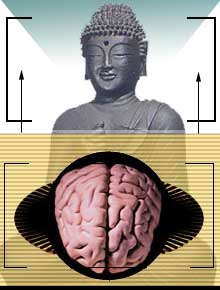Aversion, Attachment, and Addiction
by Elizabeth Critton, The Easier, Softer Way, Aug 18, 2013
Venice, California (USA) -- Recovering from drug addiction is often a difficult and painful process. We spend years of our lives running from every thought and emotion that arises. Intoxicants are the illusion of the perfect solution. We believe we have found the quieted and peaceful mind that we are looking for.
 Upon getting sober, we are suddenly left without the anesthesia of intoxicants. As thoughts and emotions begin to arise into our consciousness, we find ourselves suffering greatly. The years of addiction clouded our minds and hearts, pushing out unpleasant thoughts and emotions. When the mind begins to clear, these thoughts and emotions arise and we do not have any tools to work with them.
Upon getting sober, we are suddenly left without the anesthesia of intoxicants. As thoughts and emotions begin to arise into our consciousness, we find ourselves suffering greatly. The years of addiction clouded our minds and hearts, pushing out unpleasant thoughts and emotions. When the mind begins to clear, these thoughts and emotions arise and we do not have any tools to work with them.
Buddhism offers the perfect toolset for the recovering addict. Learning about Buddhist principles, the reasons for our behavior begin to make more sense. Teachings on cause and effect open the door to this possibility. For the first time, we take responsibility for our actions. Addiction and the behavior that goes along with it have a root cause in our minds.
The Three Unwholesome Roots, or Three Poisons are especially applicable to recovering from addiction. The first poison, ignorance, is the predecessor to the other two. In ignorance, our view of the world is greatly distorted. We separate from the rest of the world, identifying with “self.” Identifying with self creates a divide. If we have “self,” then everything else in the world is “they” or “them.” This dichotomy gives way to our aversive or attaching relationships to things that are not self.
The second poison (aversion) is our tendency to deny, run, hate, or act aggressively toward something. Without mindfulness and understanding, aversion is often thought to be from other people, situations, or harsh words or actions. However, more practice reveals that aversion is internal; it is the emotion, thought, or sensation that we are averting from, hating, or judging. Getting sober causes a great amount of repressed emotions and thoughts to arise, and our natural and unskillful reaction is to avert. Buddhism teaches the newly sober addict that the aversion is not from anything except these feelings, and we must compassionately and mindfully accept these feelings as they are with equanimity. As AjahnSumedho puts it, “Right now, it’s like this.”
Attachment, the third poison, is not only applicable in our use of intoxicants. It is also relevant to our life without intoxicants. Attachment and greed cause us to want things to be a certain way. If we are attached to an idea of how things should be, we suffer greatly. Similarly, we suffer if we are craving something other than what we have in the present moment. For recovering addicts, this craving for control and anesthesia rips the present moment away.
Although the Buddhist teachings are a great to read and learn about, it is not the only true path. In order to see what the teachings really are, we must sit and meditate for ourselves. Listening to a teacher speak of the dharma is a great way to learn, but it is through personal experience that we begin to uncover our hearts, leave our habit energies behind, and grow into more mindful, compassionate beings.
---------
The Easier Softer Way is a site dedicated to drug addiction recovery and Buddhist practices. Located in Venice, California, it provides meditation coaching, mindfulness coaching, and sober coaching services. Find out more at:
Website: http://TheEasierSofterWay.com
Facebook: http://Facebook.com/TheEasierSofterWay
Twitter: http://Twitter.com/EasierSofter
Google+ page: http://plus.google.com/100146888366412647279
Read also: Meditation calms mind, helps heal body

 Upon getting sober, we are suddenly left without the anesthesia of intoxicants. As thoughts and emotions begin to arise into our consciousness, we find ourselves suffering greatly. The years of addiction clouded our minds and hearts, pushing out unpleasant thoughts and emotions. When the mind begins to clear, these thoughts and emotions arise and we do not have any tools to work with them.
Upon getting sober, we are suddenly left without the anesthesia of intoxicants. As thoughts and emotions begin to arise into our consciousness, we find ourselves suffering greatly. The years of addiction clouded our minds and hearts, pushing out unpleasant thoughts and emotions. When the mind begins to clear, these thoughts and emotions arise and we do not have any tools to work with them.